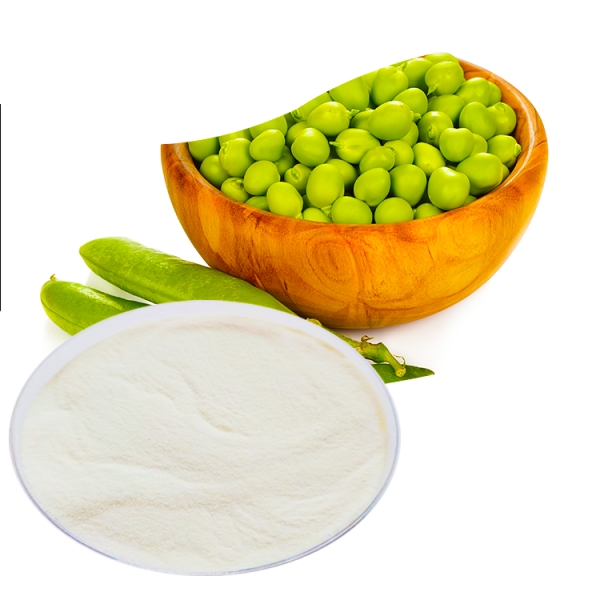What is Pea Protein Peptide and Its Biological Activity?
In recent years, with the continuous improvement of people’s health awareness, sustainability and dietary preferences, the demand for plant protein has surged. Among the many plant proteins, pea protein, especially pea protein peptide, has become a popular choice. Many countries have used pea protein as a raw material or auxiliary material in products such as plant protein solid beverages, artificial meat, sausages, energy bars, cookies, and noodles.
Learn about pea protein peptides
Pea peptides are short-chain amino acids extracted from pea protein, which is extracted from pea. Pea protein itself is a complete protein, meaning it contains all nine essential amino acids required for human health. However, the hydrolysis process breaks the protein down into smaller peptides, which improves its bioavailability and functional properties.
Pea protein peptide powder is made through this hydrolysis process, and the fine powder is rich in bioactive peptides. These peptides are known for their multiple health benefits, including antioxidant, anti-inflammatory and immune-boosting properties. The bioactivity of these peptides comes from their ability to interact with biological systems, affecting physiological functions and promoting health.
Biological activity of pea protein peptide
The bioactivity of pea protein peptides is an important area of research as these compounds show great potential in various health applications. The following are some key aspects of their bioactivity:
1. Antioxidant Activity
One of the most notable benefits of pea protein peptides is their antioxidant activity. Antioxidants are compounds that help neutralize free radicals in the body, which can cause oxidative stress and contribute to chronic diseases such as cancer, cardiovascular disease, and neurodegenerative disorders. Research shows that pea protein peptides have powerful antioxidant properties, making them a valuable addition to functional foods and dietary supplements.
The antioxidant activity of pea protein peptides stems from their ability to scavenge free radicals and inhibit lipid peroxidation. This means they can help protect cells from damage caused by oxidative stress, thereby promoting overall health.
2. Anti-inflammatory effect
Chronic inflammation is a contributing factor to many health issues, including obesity, diabetes, and heart disease. Pea protein peptides have been shown to have anti-inflammatory properties, helping to reduce the effects of inflammation in the body. Studies have shown that these peptides can inhibit the production of pro-inflammatory cytokines, thereby reducing inflammation and promoting a healthier immune response.
3. Muscle Recovery and Performance
For athletes and fitness enthusiasts, protein plays a vital role in muscle recovery and athletic performance. Pea protein peptides have been found to promote muscle recovery after exercise due to their high digestibility and rich amino acid content. The branched-chain amino acids (BCAAs) contained in pea protein peptides are particularly beneficial because BCAAs play a vital role in muscle protein synthesis and recovery.
4. Weight Management
Pea protein peptides can also help with weight management. It is well known that a high-protein diet can promote satiety and help people feel fuller for longer. Adding pea protein peptide powder to meals or drinks can help control appetite and reduce overall calorie intake, which is a very effective method for people who want to manage their weight.
Application of pea protein peptide in solid beverages
Pea protein peptide powder is a versatile ingredient for solid beverages. Solid beverages such as protein bars, meal replacement shakes and fortified snacks are becoming increasingly popular among health-conscious consumers. Pea protein peptides can enhance the nutritional value of these products while providing functional benefits.
1. Nutritional enhancement
By adding pea protein peptide powder to solid beverages, manufacturers can significantly increase the protein content of their products. This is especially attractive to consumers seeking plant-based protein sources because pea protein does not contain common allergens such as dairy and soy. In addition, the amino acid composition of pea protein makes it suitable for a variety of dietary requirements, including vegan and vegetarian.
2. Improve taste and flavor
Pea protein peptides can improve the taste and flavor of solid beverages. The hydrolysis process makes its texture smoother and easier to incorporate into various formulas. In addition, pea protein peptides have a neutral flavor and can be added to various products without changing their taste.
3. Functional advantages
In addition to nutritional enhancement, pea protein peptides can also bring functional benefits to solid beverages. Its antioxidant and anti-inflammatory properties help improve the overall health benefits of the product and attract consumers who are seeking healthy functional foods.
In summary
Pea protein peptides are a valuable addition to the field of plant nutrition. Their biological activities, especially in terms of antioxidant and anti-inflammatory properties, make them a top choice for health-conscious consumers. As the demand for plant protein sources continues to grow, the application of pea protein peptide powder in solid beverages and other functional foods is likely to increase.
Whether you’re an athlete looking to restore muscle, someone looking to manage their weight, or simply looking to improve your overall health, pea peptides offer a versatile and nutritious option. As research continues to uncover the many benefits of these bioactive compounds, it’s clear that pea peptides are more than just a trend, they’re a powerful ally in your quest for health.
Post time: Jul-15-2025






